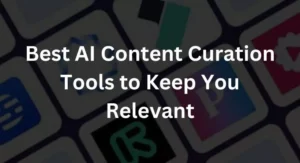
In the fast-paced world of digital marketing, staying ahead of the curve is essential. As technology advances, artificial intelligence (AI) has become a crucial tool for marketers. According to McKinsey Global Institute, AI offers significant value opportunities in marketing, and its adoption has grown exponentially. In this article, we’ll explore the essential AI marketing tools you need to supercharge your marketing strategy.
Understanding AI Marketing Tools

AI marketing tools encompass a wide range of applications, from full-fledged AI marketing platforms like Google AI and Microsoft Azure to individual AI marketing apps such as Jasper.ai. These tools leverage automation, machine learning, and natural language processing to streamline various critical marketing tasks, including:
1. Identifying Keyword Patterns
Understanding what drives conversions is paramount in marketing. AI tools can identify keyword patterns that lead to successful conversions, allowing you to tailor your content accordingly.
2. Optimizing Keyword Bidding Strategies
Maximizing returns on digital ads is a constant challenge. AI can help optimize keyword bidding strategies, ensuring you get the most out of your advertising budget.
3. Real-time Content Creation
Creating content in real-time, such as ad copy or social media posts, is made more efficient with AI. These tools can generate content at scale and speed, helping you stay engaged with your audience.
4. Data Analysis
In today’s data-driven marketing landscape, AI tools can rapidly analyze large datasets, detect trends, and uncover anomalies. This enables data-driven decision-making.
5. Customer Targeting
AI can automatically group likely customers, allowing for more targeted and effective ad campaigns.
6. Predictive Analytics
AI tools can predict consumer behavior’s, helping you create more accurate customer profiles and anticipate their needs.
You may also loke reading: AI Marketing Tools and Strategies: What to Know
7 Key Types of AI Marketing Tools
Now, let’s delve into the seven key types of AI marketing tools:
1. AI Content Creation Tools
AI content creation tools, such as HubSpot and Jasper.ai, use NLP and machine learning algorithms to generate marketing content automatically. These tools make it easier to produce content for emails, websites, blogs, and social media posts.
2. AI-Powered social media Tools
AI-powered social media tools like Rapidly can generate and coordinate content for social media posts faster than human counterparts. They help with scheduling, monitoring brand mentions, and analyzing social sentiment.
3. AI Email Marketing Tools
Tools like Lavender automate email composition and scheduling, streamlining marketing campaigns. They also offer features like automated responses and contact management.
4. Natural Language Processing (NLP) Tools
NLP tools, such as IBM’s Watson Assistant and Relative Insight, analyze customer feedback and social media conversations to gain insights into customer sentiment and preferences.
5. AI-Powered Call Tracking Tools
AI-powered call tracking and transcription provide insights into phone conversations, enabling marketers to track conversions and optimize media spending.
6. AI Recommendation Engine Tools
These tools, used by e-commerce sites like Amazon, leverage machine learning to make product recommendations based on user behaviour.
7. AI-Driven Analytics Tools
AI-driven analytics tools from companies like IBM and Google Cloud help businesses make data-driven decisions, optimize marketing strategies, and identify growth opportunities.
7 Steps to Choose the Right AI Marketing Tools

Selecting the right AI marketing tools for your business is crucial. Follow these steps to make informed choices:
Step 1: Identify Your Marketing Objectives
Define your primary marketing goals. Determine whether you need tools for content generation, analytics, or other specific purposes.
Step 2: Evaluate Available Resources
Assess your in-house resources and consider whether you need external expertise. Factor training costs into your budget.
Step 3: Assess Compatibility with Existing Systems
Ensure that the AI tools you choose can integrate seamlessly with your existing technology stack.
Step 4: Research AI Marketing Tools
Stay up-to-date with the latest AI marketing tools and their development roadmaps. Talk to developers to understand future capabilities.
Step 5: Request Demos and Trials
Test AI marketing tools before making a commitment. Request demos and explore free trials to gauge their effectiveness.
Step 6: Seek Reviews
Listen to feedback from industry peers and colleagues who have experience with AI marketing tools. Their insights can guide your decisions.
Step 7: Consider Support
Choose AI tool providers that offer comprehensive support, including onboarding and training. Ensure they can address your needs 24/7.
Best Practices for Implementing AI Marketing Tools
Implementing AI tools effectively requires a strategic approach. Follow these best practices for success:
Start Small and Scale Up
Begin with one tool or a specific campaign to ease the learning curve. Gradually scale up as your team becomes comfortable with AI solutions.
Keep Upgrading
AI tools need regular updates to stay effective. Stay informed about the latest trends in AI to make informed decisions about tool upgrades.
Provide Training
Properly train your marketing team on how to use AI tools. Select vendors with robust onboarding programs to ensure success.
Monitor and Evaluate Performance
Regularly assess the performance of AI tools to ensure they align with your marketing goals and maintain data quality.
Conclusion
In conclusion, AI marketing tools offer an array of opportunities for businesses looking to enhance their marketing strategies. By choosing the right tools and implementing them effectively, you can streamline marketing tasks, improve customer engagement, and boost your ROI. Stay ahead in the competitive marketing landscape by embracing the power of AI.
FAQs
1. What are AI marketing tools?
AI marketing tools are software applications that use artificial intelligence to automate marketing tasks, analyze data, and optimize marketing campaigns.
2. How can AI content creation tools benefit my marketing efforts?
AI content creation tools can generate marketing content, such as emails, website copy, and social media posts, quickly and efficiently, saving time and resources.
3. What is the significance of predictive analytics in AI marketing?
Predictive analytics in AI marketing helps businesses anticipate customer behaviour, enabling more targeted and effective marketing campaigns.
4. How can AI-powered call tracking tools enhance marketing performance?
AI-powered call tracking tools provide insights into phone conversations, helping marketers track conversions, optimize ad spend, and improve overall marketing performance.
5. Why is it essential to monitor and evaluate the performance of AI marketing tools?
Monitoring and evaluating the performance of AI marketing tools is crucial to ensure they align with your marketing goals and maintain data quality, ultimately improving your ROI.





